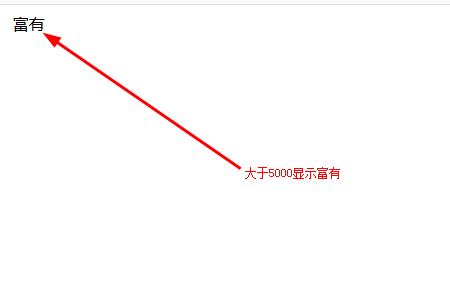How to use the ternary operator in JavaScript
The ternary operator in How to use the ternary operator in How to use the ternary operator in JavaScript is the only operator that uses three operators. Its usage syntax is [Conditional expression? Expression 1: Expression 2;].

The operating environment of this article: Windows 7 system, javascript version 1.8.5, Dell G3 computer.
The ternary operator is one of the operators. As the name suggests, it is the only operator that uses three operators. Due to its nature, it can be said to be a simple rewrite of the if statement. The Boolean value represents its Propositions are two values of true or false, written as true and false respectively, and are mainly used for conditional branches.
Let’s look at the specific use of the ternary operator.
Let’s first take a look at the syntax of if statements and ternary operators
How to use if conditional statements in How to use the ternary operator in How to use the ternary operator in JavaScript , we use the if statement to have three lines or more expressions
Execute expression 1 when the conditional expression is true (true), and execute expression 2 when it is false (false).
if(条件表达式){
//表达式1
} else {
//表达式2
}However, if you use the ternary operator, you can briefly describe the same content as the above if statement in one line, as shown below.
The syntax of the ternary operator
条件表达式?表达式1:表达式2;
Let’s look at a specific example
If If the amount of money is greater than 5000 (including 5000), it means rich. If it is less than 5000, it means poor.
The if statement code is as follows
<!DOCTYPE html>
<html>
<head>
<meta charset="utf-8">
<title>How to use the ternary operator in How to use the ternary operator in JavaScript</title>
</head>
<body>
<script>
var money = 10000;
if (money >= 5000) {
document.write ("富有");
} else {
document.write ("贫穷");
}
</script>
</body>
</html>The running result is as follows

Next, let’s change the value of the variable money to 3000.
<script>
var money = 3000;
if (money >= 5000) {
document.write ("富有");
} else {
document.write ("贫穷");
}
</script>The running results are as follows

The code using the ternary operator is as follows
<!DOCTYPE html>
<html>
<head>
<meta charset="utf-8">
<title>How to use the ternary operator in How to use the ternary operator in JavaScript</title>
</head>
<body>
<script>
var money = 10000;
money > 5000 ? document.write("富有") : document.write("贫穷") ;
</script>
</body>
</html>Due to the value of the variable money is 10000 greater than 5000, so it appears as "rich".

Next, let’s change the value of the variable money to 3000.
<script>
var money = 3000;
money > 5000 ? document.write("富有") : document.write("贫穷") ;
</script>The running results are as follows

#The above is the entire content of this article. For more exciting content, you can pay attention to the php Chinese website. Column! ! !
The above is the detailed content of How to use the ternary operator in JavaScript. For more information, please follow other related articles on the PHP Chinese website!

Hot AI Tools

Undresser.AI Undress
AI-powered app for creating realistic nude photos

AI Clothes Remover
Online AI tool for removing clothes from photos.

Undress AI Tool
Undress images for free

Clothoff.io
AI clothes remover

Video Face Swap
Swap faces in any video effortlessly with our completely free AI face swap tool!

Hot Article

Hot Tools

Notepad++7.3.1
Easy-to-use and free code editor

SublimeText3 Chinese version
Chinese version, very easy to use

Zend Studio 13.0.1
Powerful PHP integrated development environment

Dreamweaver CS6
Visual web development tools

SublimeText3 Mac version
God-level code editing software (SublimeText3)

Hot Topics
 1387
1387
 52
52
 What should I do if I encounter garbled code printing for front-end thermal paper receipts?
Apr 04, 2025 pm 02:42 PM
What should I do if I encounter garbled code printing for front-end thermal paper receipts?
Apr 04, 2025 pm 02:42 PM
Frequently Asked Questions and Solutions for Front-end Thermal Paper Ticket Printing In Front-end Development, Ticket Printing is a common requirement. However, many developers are implementing...
 Who gets paid more Python or JavaScript?
Apr 04, 2025 am 12:09 AM
Who gets paid more Python or JavaScript?
Apr 04, 2025 am 12:09 AM
There is no absolute salary for Python and JavaScript developers, depending on skills and industry needs. 1. Python may be paid more in data science and machine learning. 2. JavaScript has great demand in front-end and full-stack development, and its salary is also considerable. 3. Influencing factors include experience, geographical location, company size and specific skills.
 Demystifying JavaScript: What It Does and Why It Matters
Apr 09, 2025 am 12:07 AM
Demystifying JavaScript: What It Does and Why It Matters
Apr 09, 2025 am 12:07 AM
JavaScript is the cornerstone of modern web development, and its main functions include event-driven programming, dynamic content generation and asynchronous programming. 1) Event-driven programming allows web pages to change dynamically according to user operations. 2) Dynamic content generation allows page content to be adjusted according to conditions. 3) Asynchronous programming ensures that the user interface is not blocked. JavaScript is widely used in web interaction, single-page application and server-side development, greatly improving the flexibility of user experience and cross-platform development.
 How to merge array elements with the same ID into one object using JavaScript?
Apr 04, 2025 pm 05:09 PM
How to merge array elements with the same ID into one object using JavaScript?
Apr 04, 2025 pm 05:09 PM
How to merge array elements with the same ID into one object in JavaScript? When processing data, we often encounter the need to have the same ID...
 How to achieve parallax scrolling and element animation effects, like Shiseido's official website?
or:
How can we achieve the animation effect accompanied by page scrolling like Shiseido's official website?
Apr 04, 2025 pm 05:36 PM
How to achieve parallax scrolling and element animation effects, like Shiseido's official website?
or:
How can we achieve the animation effect accompanied by page scrolling like Shiseido's official website?
Apr 04, 2025 pm 05:36 PM
Discussion on the realization of parallax scrolling and element animation effects in this article will explore how to achieve similar to Shiseido official website (https://www.shiseido.co.jp/sb/wonderland/)...
 The difference in console.log output result: Why are the two calls different?
Apr 04, 2025 pm 05:12 PM
The difference in console.log output result: Why are the two calls different?
Apr 04, 2025 pm 05:12 PM
In-depth discussion of the root causes of the difference in console.log output. This article will analyze the differences in the output results of console.log function in a piece of code and explain the reasons behind it. �...
 Is JavaScript hard to learn?
Apr 03, 2025 am 12:20 AM
Is JavaScript hard to learn?
Apr 03, 2025 am 12:20 AM
Learning JavaScript is not difficult, but it is challenging. 1) Understand basic concepts such as variables, data types, functions, etc. 2) Master asynchronous programming and implement it through event loops. 3) Use DOM operations and Promise to handle asynchronous requests. 4) Avoid common mistakes and use debugging techniques. 5) Optimize performance and follow best practices.
 How to implement panel drag and drop adjustment function similar to VSCode in front-end development?
Apr 04, 2025 pm 02:06 PM
How to implement panel drag and drop adjustment function similar to VSCode in front-end development?
Apr 04, 2025 pm 02:06 PM
Explore the implementation of panel drag and drop adjustment function similar to VSCode in the front-end. In front-end development, how to implement VSCode similar to VSCode...




